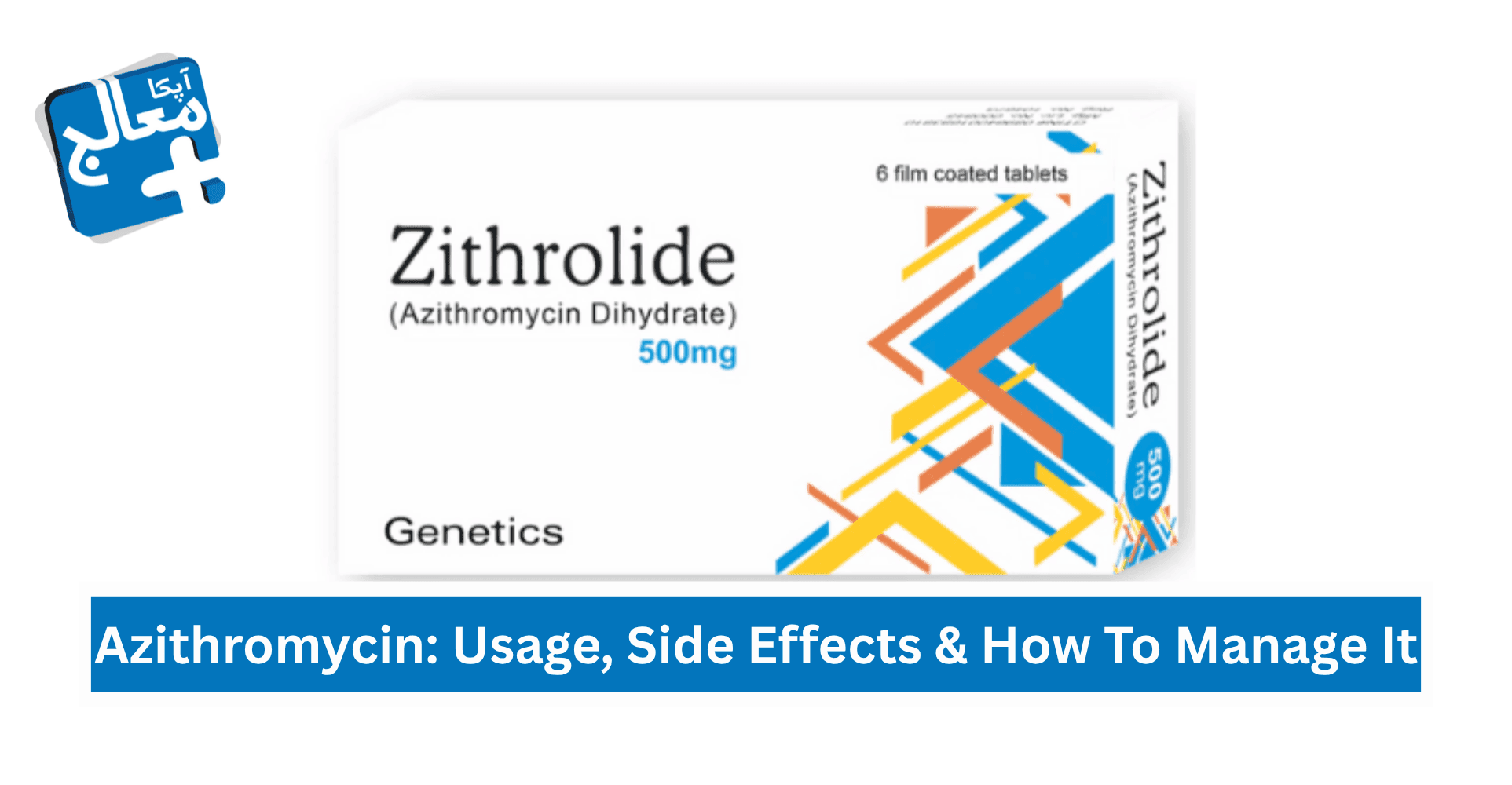What Is Azithromycin? Usage, Side Effects & How To Manage It

Azithromycin is a widely used antibiotic. It is effective against various bacterial infections, making it a common prescription in general and hospital practice. This blog will discuss azithromycin uses, dosage, side effects, and tips to manage them, along with FAQs for readers' daily medical learning.
So, let's dive into this informative blog post.
You may also like to read: "15 Best Foods to Improve Gut Health Naturally - What Doctors Say"
What is Azithromycin?
Azithromycin is an antibiotic used to treat infections caused by bacteria. They inhibit bacterial growth in the body by preventing the synthesis of proteins in bacteria that are essential for their development. By stopping bacterial growth, we can treat the infection. It commonly treats respiratory tract infections, skin infections, ear infections, eye infections, sexually transmitted diseases, and pelvic inflammatory diseases. It will not treat colds, the flu, or infections caused by viruses.
Where is Azithromycin Used?
Azithromycin is used to treat
-
Community-acquired pneumonia (CAP)- Lung infection acquired outside hospitals, causing cough, fever, and difficulty breathing.
-
Chlamydia Trachomatis conjunctivitis- Eye infection caused by Chlamydia bacteria, leading to redness, discharge, and irritation.
-
Trachoma- Chronic eye infection by Chlamydia trachomatis, causing scarring and potential blindness.
-
Mycobacterium avium complex (MAC) infection- Opportunistic bacterial infection in immunocompromised patients causing lung or systemic disease.
-
Acute Pharyngitis- Sudden inflammation of the throat leading to pain, scratchiness, and difficulty swallowing.
-
Otitis Media- Middle ear infection causing ear pain, fever, and sometimes hearing problems.
-
Acute tonsillitis- Rapid onset of inflammation of the tonsils leading to sore throat, fever, and swollen glands.
-
Sinusitis- Inflammation of the sinuses causing facial pain, congestion, and nasal discharge.
-
Acute Bronchitis- Sudden inflammation of the bronchial tubes causing cough with mucus and chest discomfort.
-
Skin infections- Bacterial infections of the skin cause redness, swelling, pain, and sometimes pus formation.
-
Chlamydia infections- Sexually transmitted bacterial infections often cause genital discharge and pain during urination.
How Should Azithromycin Be Taken?
-
With or without Food: It can be taken with or without food, at least half an hour before a meal or 2 hours after a meal. However, taking it with food may reduce stomach upset.
-
Dosage: Usually 500 mg on day 1, then 250 mg daily for 4 days OR 500 mg daily for 3 days (depending on infection type).
-
Timing: Take it at the same time every day to maintain blood levels.
Also read: "The Importance of Vaccinations for Children in Pakistan 2025"
19 Most Common & Rare Side Effects of Azithromycin & How to Manage Them?
Azithromycin may cause side effects, though not everyone experiences them.
Common Side Effects of Azithromycin:
1. Diarrhea (دست)
-
Reason: Azithromycin disturbs gut bacteria balance, leading to diarrhea in some patients.
-
How to manage: Stay hydrated and take probiotics if advised.
2. Abdominal Pain and Nausea (متلی)
-
Reason: Because it irritates the stomach lining and affects gut motility.
-
How to manage: Take with food and avoid heavy or acidic meals.
3. Flatulence (پیٹ میں گیس بننا)
-
Reason: It is caused by disturbing the normal gut bacteria balance, leading to increased gas production.
-
How to manage: Eat light, avoid gas-producing foods, and stay active.
4. Anorexia (بھوک کی کمی)
-
Reason: It affects the appetite-regulating center, leading to loss of appetite.
-
How to manage: Eat small, frequent meals and choose nutrient-dense foods.
5. Eosinophilia counts Increased (ایوزینوفل خلیوں کی زیادتی)
-
Reason: It triggers immune reactions, causing elevated eosinophil levels.
-
How to manage: Monitor blood counts and consult a doctor if symptomatic.
6. Leukopenia (سفید خون کے خلیوں کی کمی)
-
Reason: It can suppress bone marrow, causing reduced white blood cell count.
-
How to manage: Discontinue Azithromycin and consult your doctor for blood count monitoring and alternative treatment.
7. Neutropenia (سفید خون کے خلیوں کی کمی)
-
Reason: It may decrease neutrophil production, leading to low neutrophil counts.
-
How to manage: stop Azithromycin and consult your doctor for blood count monitoring and further management.
Rare Side Effects of Azithromycin:
1. Insomnia (بے خوابی)
- Reason: It may affect central nervous system activity, causing sleep disturbances.
-
How to manage: Take Azithromycin earlier in the day and practice good sleep hygiene.
2. Dizziness and headache (چکر آنا اور سر درد)
-
Reason: It may affect the central nervous system, causing these symptoms.
-
How to manage: Rest in a quiet place and stay hydrated.
3. Paranesthesia (سوئیاں چبھن، یا سن ہونا)
-
Reason: It alters nerve function, leading to tingling or numbness sensations.
-
How to manage: Inform the doctor if it persists or worsens.
4. Dyspepsia(بدہضمی)
-
Reason: It irritates the stomach lining, causing indigestion and discomfort.
-
How to manage: Take with food and avoid spicy or acidic meals.
5. Rash (خارش یا جلد پر دانے)
-
Reason: It can cause allergic skin reactions, leading to rashes.
-
How to manage: Stop medication and seek medical advice if severe.
6. Arthralgia (جوڑوں کا درد)
-
Reason: It may trigger immune-mediated joint pain.
-
How to manage: Use mild pain relievers if needed and consult a doctor.
7. Fatigue(تھکاوٹ)
-
Reason: It can affect energy metabolism, leading to tiredness.
-
How to manage: Get adequate rest and avoid strenuous activities.
8. Deafness (بہرہ پن)
-
Reason: It may cause reversible ototoxicity, affecting hearing temporarily.
-
How to manage: Discontinue the drug and consult a doctor immediately.
9. Chest pain (چھاتی میں درد)
-
Reason: It can cause cardiac side effects or gastrointestinal reflux, presenting as chest pain.
-
How to manage: stop taking Azithromycin and seek immediate medical attention to rule out serious causes.
10. Hepatitis (جگر کی سوزش)
-
Reason: It can cause liver inflammation due to its hepatic metabolism and toxicity
-
How to manage: Discontinue Azithromycin immediately and consult your doctor for liver function assessment and treatment.
11. Angioedema (جلد یا ٹشوز کی اچانک سوجن)
-
Reason: It can cause allergic reactions, leading to deep tissue swelling.
-
How to manage: Stop Azithromycin immediately and seek emergency medical care.
12. Photosensitivity Reaction (دھوپ میں جلد پر الرجی یا خارش ہونا)
-
Reason: It increases skin sensitivity to sunlight, causing rash or burns.
-
How to manage: avoid direct sunlight, use sunscreen, and wear protective clothing. Consult with a doctor if severe burns occur.
5 Azithromycin Brands in Pakistan
Here are 5 common brands of Azithromycin in Pakistan:
-
Zithrocin (by Hilton Pharma)
-
Azomax (by Searle)
-
Zithromax (by Pfizer)
-
Azipro (by Getz Pharma)
Azithromycin Price in Pakistan
Azithromycin is available under various brand names in Pakistan, and prices may vary depending on the brand, dosage, and pharmacy. Here is a general price range:
-
Zithromax (Pfizer) – Rs. 500–650 for a pack of 3 tablets (500mg)
-
Azomax (Searle) – Rs. 400–550 for 3 tablets (500mg)
-
Zithrocin (Hilton Pharma) – Rs. 350–500 for 3 tablets (500mg)
-
Azipro (Getz Pharma) – Rs. 300–450 for 3 tablets (500mg)
-
Zithrolide (Genetics Pharma) – Rs. 280–400 for 3 tablets (500mg)
Note: Prices may differ slightly by city, pharmacy, or due to stock availability. Always purchase medicines from licensed pharmacies and consult your doctor before starting any antibiotics.
Learn: "Family Medicine vs. Internal Medicine: Who Should You Choose?"
Final Words
Azithromycin remains a powerful, well-tolerated antibiotic when used appropriately. Always follow your doctor's advice, complete the prescribed course, and stay alert to potential side effects.
According to CDC Antibiotic Stewardship, 2019
"Responsible antibiotic use preserves their effectiveness for future generations."
Azithromycin should always be used on a doctor's prescription to ensure safe and effective treatment. If you are experiencing any of these symptoms or infections, consult the best general physician in Pakistan, or if you wish to purchase it online, then visit www.apkamuaalij.com. For a quick consultation, dial 0423-2377001 and book your doctor's appointment through Apka Muaalij, the best telehealth platform in Pakistan.
FAQs (Frequently Asked Questions)
Why Complete the Full Course of Azithromycin?
Stopping antibiotics early can lead to incomplete eradication of bacteria and contribute to antibiotic resistance, a serious global health concern.
What Happens if I Miss a Dose?
Take it as soon as you remember. If it is near your next dose time, skip the missed dose. Do not double-dose to compensate.
Can I Drink Alcohol While Taking Azithromycin?
It is safe to consume alcohol in moderation during azithromycin therapy, but avoid excess as it can worsen side effects.
What Happens if I Miss a Dose?
Take it as soon as you remember. If it is near your next dose time, skip the missed dose. Do not double-dose to compensate.
Is Azithromycin the same as amoxicillin?
No, Azithromycin is a macrolide; amoxicillin is a penicillin-type antibiotic.
How quickly does Azithromycin work?
Symptoms improve within 2–3 days, but complete the course.
Is Azithromycin safe for children?
Yes, in pediatric dosing prescribed by a doctor.

Dr. Bisma Shehzadi
Dr. Bisma Shehzadi, Pharm.D, RPh, is working as a professional seasoned content writer with 4 years of experience in healthcare and wellness writing. With a strong pharmaceutical background and clinical knowledge, she creates research-driven, search-optimized articles that simplify complex medical topics. Her writing enables her to craft content that educates, promotes wellness, and supports healthcare initiatives among online users and readers.